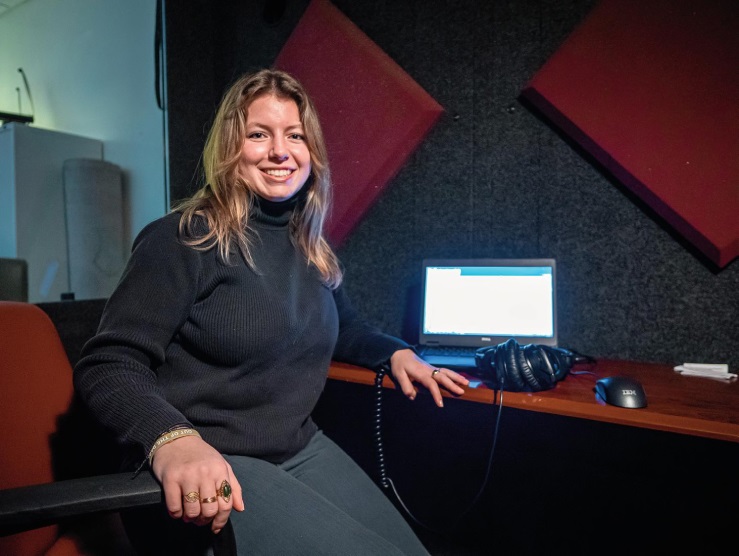
NEXT STEPS: Evyn Stewart '22 completed an independent graduate-level study in speech-language pathology. She applied to a dozen audiology schools across the country and will be attending Salus University in August.
Speech-language pathologist and Associate Professor of Communication Sciences and Disorders, Elaine Hitchcock last year received a National Institutes of Health grant to research the telepractice delivery of speech, and currently leads the research and clinical opportunities in the Clinical Biofeedback Lab. Hitchcock, who supervises Stewart’s research study, says that Stewart showed enthusiasm and commitment from the beginning, and has demonstrated maturity and independence unexpected in someone so young. Stewart, who has worked as a restaurant hostess and a kayak/paddleboard tour guide in Ocean City for the past three summers, trekked to the MSU-CBL for her volunteer service.
In her graduate-level study, Stewart researched the very thing with which she was diagnosed: unilateral hearing loss in adolescents. She compared how their speech perception compares to their "typical hearing peers."
"How many students, not graduate students, undergraduate students would drive two and a half hours to be a volunteer?" Hitchcock says of Stewart's weekly trips to the biofeedback lab over the summer. "What we identified pretty quickly was that Stewart was a highly skilled student. For an
independent study, you have to want to work with them, as the professor. They have to be somebody that you feel like you can trust, that you're not chasing down and that will do quality work. That's the kind of student you really want to support. Evyn was still an undergraduate – and a varsity athlete – and did an amazing job."
In her graduate-level study, Stewart researched the very thing with which she was diagnosed: unilateral hearing loss in adolescents. She compared how their speech perception compares to their “typical hearing peers.” Under Hitchcock’s guidance, she worked with research participants on various tasks, in order to record how they say, produce and repeat sounds or words, which was then contrasted with people who have no hearing impairments.
During the research, she was working with another Montclair student, Ashley Martino, officially known as “Participant 05” in the study. Martino, 22, has some hearing loss in her left ear due to a cholesteatoma, a cyst or skin growth
behind the eardrum. A graduate student in Speech-Language Pathology, Martino was recruited as a research participant by another professor, who was aware of her hearing loss. She says she has a hearing aid she does not wear. "My whole life, I've learned to adapt," she says.
Stewart handed her headphones and ran her through a series of tests. In one test, Stewart had her repeat a list of “crazy made-up words,” beginning with single syllables, followed by double and triple and finally quadrisyllabic words, which Stewart recorded. The goal, she says, was to compare Martino’s and other research subjects’ perception of the words they hear, with their pronunciation of them, and see how they may differ.
Stewart says that someone with unilateral hearing loss may have difficulty deciphering between 'b' and 'p' sounds, something with which she also struggles. "So, when I ask them to say 'bo-ta-go' or whatever the made-up word is, they might say 'po-ta-go' because they didn't hear the 'b' sound from the initial output," she says.
The research is important because while there has been research on bilateral hearing loss among students, there has not been much on the impact of unilateral hearing loss in young adults, says Hitchcock. "Let's see if there's anything uniquely different in our findings that may inform the research in one direction or the other," she says.
GRAD SCHOOL BOUND
Stewart applied to a dozen audiology schools across the country and will be attending Salus University in August. "When she does, she will have three graduate level credits under her belt", says Hitchcock, who is happy for her, even though she chose audiology over SLP.
"It's not about me," Hitchcock says. "My job is to give them opportunities. It's her life, she should do what she wants. She was still here with me for a whole semester and then some, learning, growing and finding her path in life – it's amazing."
One of the first people with whom Stewart shared her decision to pursue audiology? Her audiologist of many years.
"She was really excited," Stewart says smiling.•
ABOUT THE AUTHOR:
Sylvia A. Martinez is a Montclair State University Staff Writer.